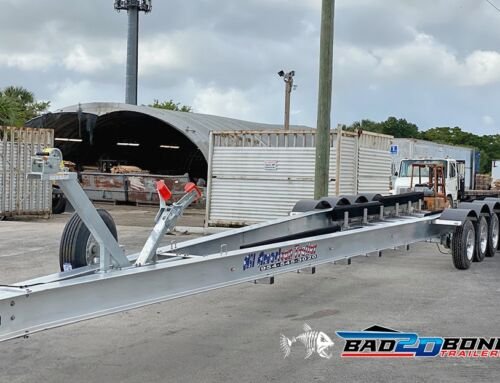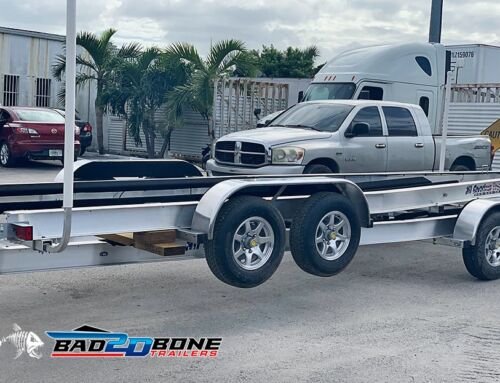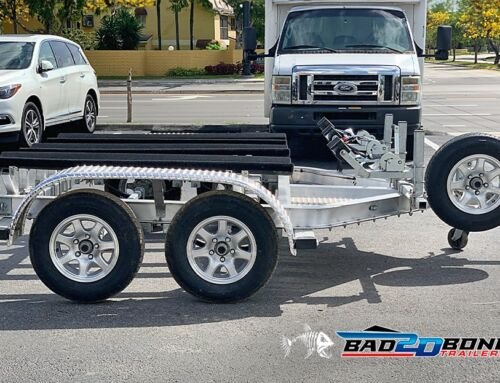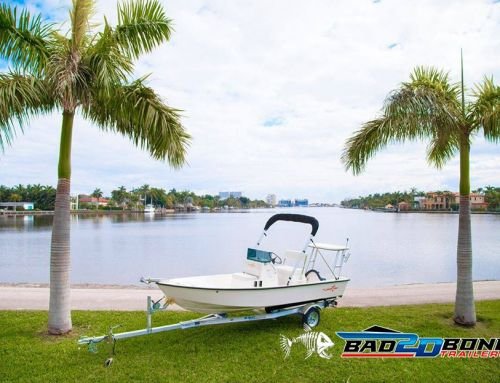Today we want to talk about the main problems that arise with boat trailers and how they can be prevented.
Lighting on Boat Trailers
Boat trailer lights often fail due to the harsh environments which they are exposed to and a lack of maintenance. However, thanks to LED lighting, these problems have been drastically reduced.
LED lights can withstand higher levels of activity than normal lights. They are also much brighter and last longer.
If you’re having light issues, it may simply be time to upgrade your trailer lights to LED.
Trailer rollers
If the rollers get warped or rusted and no longer turn, don’t worry! Rollers are easy to replace.
Things to Keep in Mind:
- Measure, especially the axles. They are available in many sizes and you will need to make sure they stick out far enough on each side of the roller to fit the retaining caps.
- Consider replacing the worn out rollers with polyethylene rollers instead of the black rubber ones. Polyethylene is much more expensive, but it will last longer.
- Don’t forget to check the bow roller/bow stop. This part takes a lot of abuse, so it needs to be replaced as well.
- End caps are important, especially for the rear roller, when loading the boat in the wind. End caps help prevent your boat hull from being damaged when you are centered on the trailer.
Tongue Jack
Today’s tongue jacks are inexpensive and disposable items. A 1,200-pound capacity galvanized swivel tongue jack can be found cheaply at most discount stores. The problem is that the price often also reflects the durability and longevity of the product.
Here are some ways to make your Tongue Jack last a little longer:
- When using a tongue jack to move your boat down the driveway, lower the jack almost all the way down. Moving it with the leg extended (at its weakest point) will cause a premature failure.
- Keep the pivot point, carriage wheel, and crank/mechanism well lubricated.
- Touch up rust spots with cold galvanized spray to keep corrosion to a minimum.
- When storing, do not use the jack to support the tongue of the trailer; this will cause the plastic wheel to eventually flatten out. Instead, use another stand, taking the weight of the trailer off of the jack.
Trailer Brakes
Brake problems are often caused due to poor maintenance. Most boat trailers employ surge brakes. Here are some common problems that could arise:
Low or no fluid: If your surge brake fluid reservoir is low or empty, you will need to fill it properly and then check your brakes again. If the seals are leaking, you will need to rebuild the actuator or purchase a replacement.
Crimped or damaged brake lines – Find the problem and repair the line. (You will need to add fluid and check the system again after the repair.)
Corroded Brake Actuator Mechanisms: Perform a full system overhaul. Start with new sets of brakes for each wheel.
Worn brake shoes or worn brake pads – You may need to replace these and also replace the drums or rotors.
Wheel Bearings
After trailer lights, wheel bearings seem to be the most prevalent problem among trailer enthusiasts. If you’re towing your boat and trailer down the highway and experience wheel bearing failure, it’s often too late. If you catch it early, you may be able to fix the problem in the field- if you’ve planned ahead and brought parts and tools. (An extra wheel hub complete with bearings and grease is a great savior.)
Before a long trip, it’s a good idea to get into the habit of checking the bearings, and tightening or replacing them if necessary, before heading out.
Winch
The winch, strap and hook can fail at the most inopportune times, usually when you are loading your boat, with a line of boaters behind you, waiting to use the ramp. Like most other components, the winch fails through misuse. Here are some tips to keep your winch running smoothly:
- Keep the winch strap straight; do not allow it to bend or wrinkle, or to double over on itself or spin while in operation.
- Keep the hook safety strap lubricated and operating freely.
- Lubricate winch gears, shafts and fasteners.
- Keep the nut tight on the winch handle; otherwise it will loosen and spin around the shaft of the handle.
- Keep the winch mounting bolts tightened to the trailer winch bracket.
- Make sure the winch and bow stop are at the correct height for your boat’s bow eye.
Axels
As the backbone of boat trailers, axles take a great deal of abuse from corrosion, overloading and shock. Consider having your trailer serviced by a professional trailer repair shop at least once every other season. Unless you are an experienced trailer repair expert, repairs to axles, suspension, and mounting hardware should be done by a professional. However, you can check for excessive corrosion, shaft sag, spring sag, and spring/attachment hardware corrosion. Check the tires for unusual wear patterns and inspect the position and levelness of the trailer from behind. These simple steps can reveal impending axle problems or even failure.
Frame
The frame is the base and backbone of the boat trailers. While you can personally check for rusted, loose, and broken welds, unless you’re a trailer expert with experience welding and frame straightening, major repairs are best left to the experts at the trailer shop. You can prevent the spread of rust by touching up the finish with cold galvanized paint or spray. Check the frame for straightness and sagging with a visual inspection from the rear, and check the tires for even wear. Inspect welds and fasteners (for bolt-on trailers) at least once every season.
Wheels and Tires
Often the problems and failures related to wheels and tires come not just from mileage wear and tear, but rather from breakdowns due to age, downtime, and ultraviolet rays. Would you like your wheels and tires to last longer?
- Frequently check for signs of damage.
- Keep them inflated; don’t let them deflate.
- If you won’t be using the trailer for a while, raise the frame and keep the wheels off the ground.
- Consider covering tires to protect them from the sun and UV Rays.
- Check the tightness of the nuts at least once every season. Do visual inspections to check and verify the straightness of the wheels.
BAD 2D BONE TRAILERS, Aluminium Boat Trailers
We offer the best repair and maintenance services for new and used trailers. We invite you to take a look at our wide portfolio of services.
Get to know us more HERE






